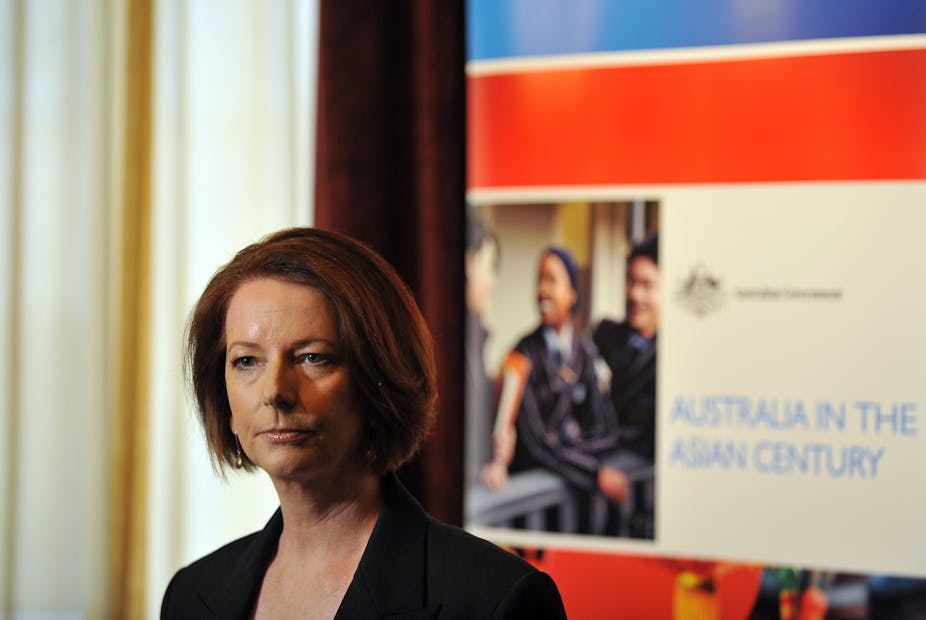Ken Henry’s team has provided a detailed and useful blueprint for future action in the Australia in the Asian Century White Paper. But the government will need to ramp up its domestic efforts to improve scientific and cultural literacy, as well as its engagement with China and Indonesia if Australia is to maximise its competitiveness in Asia.
The white paper sets five tasks: maintaining a productive and resilient Australian economy; building capabilities; operating in growing Asian markets; building sustainable security; and achieving deeper and broader relationships in Asia.
In all these areas, big asks are made of business, NGOs and the Australian people while pledging strong government action and support. This is reasonable. The Australian people as well as their government must commit the resources needed for Australia to fully embrace the benefits of its Asian neighbourhood.
But the government needs to improve its own performance in some domestic and international areas to grasp the opportunities highlighted and provide a model of leadership in the Asian Century.
Educational challenges
On the domestic front, the white paper’s authors lament the recent decline in Australian high schoolers’ reading and mathematics performance relative to Asian countries, and the decades-long erosion of Asian language studies. They call for Australia to be ranked as a top-five country in the world for reading, science and mathematics literacy by 2025, and for all Australian students to be encouraged study an Asian language throughout their schooling.
All well and good.
But mapped against what the Chief Scientist has warned is a growing “anti-science culture and the avoidance of science and maths courses by Year 11 and 12 students, it is clear that government and educational leaders have their work cut out for them.
It is not encouraging that the new secondary school physics curriculum being considered earlier in the year was criticised for containing too much "sociology of physics” and not enough equations. The government’s lukewarm response to the educational funding recommendations of the Gonski Review are of further concern.
The commitment to use new school funding arrangements to ensure access to Asian languages is sensible. As is the call for schools, universities, business and the community to encourage Asian language study. But, as with science study, spruiking demand is a vexed issue, and achieving the needed mindset change among young Australians may prove a challenge to the imagination and persuasive ability of the private and public sector alike.
Talking to Asia
On the foreign front, the white paper sets an initial priority for developing strategies with China, India, Indonesia, Japan, and South Korea as well as maintaining strong alliance ties with the United States. It envisages official and non-official dialogue with partner countries, and specifically supports “China’s participation in the region’s strategic, political and economic development”.
All this is sensible, and Australia has good ties with its neighbours, but these ties need to be energised. Given the recent controversies over policies towards Beijing and Washington, it would useful for Canberra to take up the recommendation by Linda Jakobson of the Lowy Institute and pursue an annual strategic and economic dialogue with Beijing. Such a dialogue would be a valuable forum to convey Australia’s perspectives on its US alliance and other strategic intents, while better discerning China’s own concerns and intentions.
The government also needs to take the initiative in its relations with Indonesia. President Yudhoyono terms Australia a “close friend”, and tensions arising from the abrupt cut-off of cattle exports early this year have eased. But Yudhoyono departs office in 2014, and Indonesia’s commendable decentralisation and economic growth have been accompanied by the decentralisation of corruption and a trend toward economic nationalism. Before too much longer, Indonesia’s economy will be larger than Australia’s – and future leaders in Jakarta may be less amenable to Australian interests if no initiative is taken in the near term.
The Commonwealth government should jump-start is engagement with private sector organisations with knowledge of Indonesian trade and governance issues, stimulate “second-track” dialogue with Indonesian counterparts on these issues, and organise a long overdue state visit by the prime minister to Jakarta. This should be done well in advance of Youdhoyono’s retirement.
The white paper is a valuable and timely document that will stimulate debate about the dynamic, growing, and crucial region to our north. But to keep faith with its intention to make the most of the Asian Century, the government needs to commit the financial, intellectual, and human resources needed to take a leading role.

